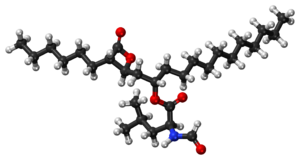Orlistat
 |
|
 |
|
| Clinical data | |
|---|---|
| Trade names | Xenical, Alli |
| AHFS/Drugs.com | Monograph |
| MedlinePlus | a601244 |
| License data | |
| Pregnancy category |
|
| Routes of administration |
Oral |
| ATC code | A08AB01 (WHO) |
| Legal status | |
| Legal status |
|
| Pharmacokinetic data | |
| Bioavailability | Negligible |
| Protein binding | >99% |
| Metabolism | In the GI tract |
| Biological half-life | 1 to 2 hours |
| Excretion | Fecal |
| Identifiers | |
|
|
| Synonyms | tetrahydrolipstatin |
| CAS Number |
96829-58-2 |
| PubChem (CID) | 3034010 |
| IUPHAR/BPS | 5277 |
| DrugBank |
DB01083 |
| ChemSpider |
2298564 |
| UNII |
95M8R751W8 |
| KEGG |
D04028 |
| ChEMBL |
CHEMBL175247 |
| ECHA InfoCard | 100.167.400 |
| Chemical and physical data | |
| Formula | C29H53NO5 |
| Molar mass | 495.735 g/mol |
| 3D model (Jmol) | Interactive image |
|
|
|
|
|
|
|
Orlistat is a drug designed to treat obesity. It is marketed as a prescription drug under the trade name Xenical by Roche in most countries, and is sold over-the-counter as Alli by GlaxoSmithKline in the United Kingdom and the United States. Its primary function is preventing the absorption of fats from the human diet by acting as a lipase inhibitor, thereby reducing caloric intake. It is intended for use in conjunction with a healthcare provider-supervised reduced-calorie diet.
Orlistat is the saturated derivative of lipstatin, a potent natural inhibitor of pancreatic lipases isolated from the bacterium Streptomyces toxytricini. However, due to its relative simplicity and stability, orlistat was chosen over lipstatin for development as an anti-obesity drug.
The effectiveness of orlistat in promoting weight loss is definite but modest. Pooled data from clinical trials suggest that people given orlistat in addition to lifestyle modifications, such as diet and exercise, lose about 2–3 kilograms (4.4–6.6 lb) more than those not taking the drug over the course of a year. Orlistat also modestly reduces blood pressure and appears to prevent the onset of type 2 diabetes, whether from the weight loss itself or to other effects. In a large randomized controlled trial, orlistat was found to reduce the incidence of diabetes by nearly 40% in obese people.
...
Wikipedia
